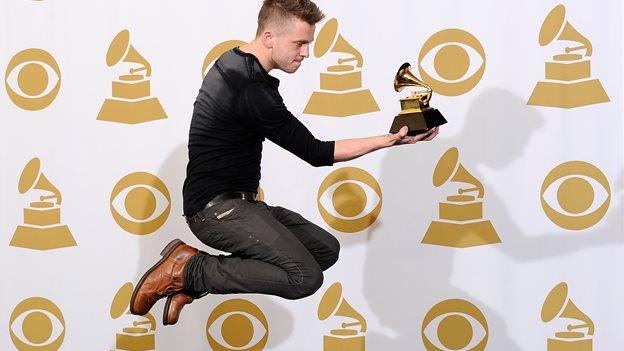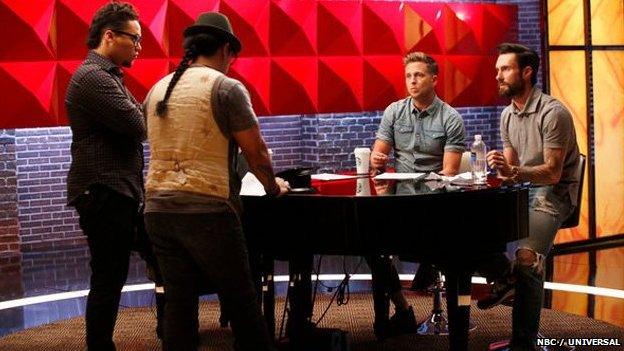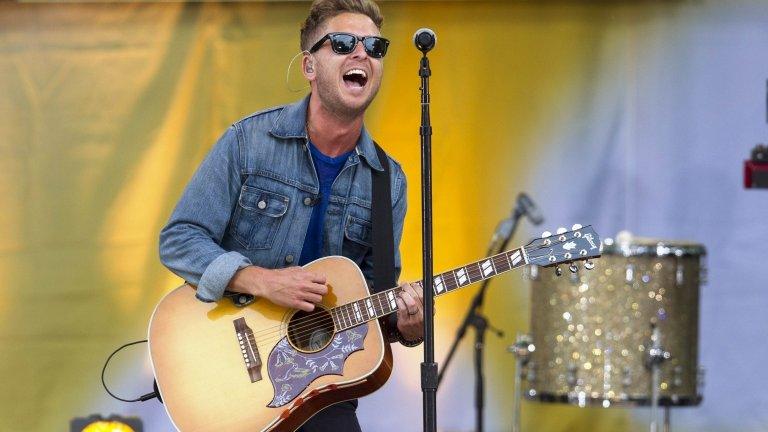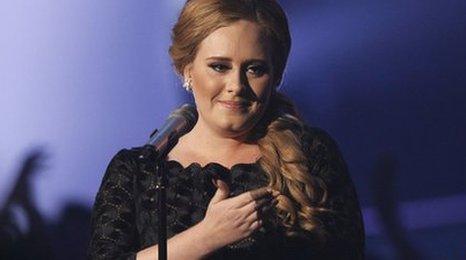Ryan Tedder: Songwriter shares his rules of pop
- Published

Tedder has recently been working with Elton John and U2
Ryan Tedder is one of the most successful songwriters of his generation.
Over the last 10 years he has written and produced hits for the likes of Adele (Rumour Has It), Beyonce (Halo), Leona Lewis (Bleeding Love) and Ellie Goulding (Burn).
Last year, his own band, OneRepublic, also scored their first UK number one with the uplifting pop earworm Counting Stars, external.
Billboard magazine crowned him songwriter of the year, external and noted Tedder made $2.5m for his efforts in 2013. He claims to be unaware, saying the knowledge would simply be a distraction.
When we meet in London, the 34-year-old, a self-confessed workaholic, proudly plays the BBC a couple of brand new songs from his phone.
One of them, a swampy Southern stomp called Love Runs Out, is earmarked as OneRepublic's next single. Another, Ghost, will become the debut single by X Factor contestant Ella Henderson.
Both sound like top-10 hits.
"I won't quote how many future number ones are on that phone," Tedder grins. "But how many future singles? About seven or eight."
As the music finishes, Tedder locks the phone with a complicated pin code ("it actually self-destructs if you get the wrong number"), pours himself a glass of red wine and shares the secrets of his songwriting.

Never release a song until it is ready
Love Runs Out was originally going to be the first single on our album (Native, released in March last year) but I couldn't crack the chorus. It gutted me because I had it marked on the board as "first single" for six months. Brent Kutzle, who is the cello and bass player in the band, said: "Man, we cannot put this out with an A+ verse and a B+ chorus."
It was completely crushing my ego but I was like: "He's right." The verse was an A and everything else was an A but the chorus was a B. So we tabled it.

The musician has written for some of pop's biggest stars, including Beyonce and Kelly Clarkson
A single requires extra attention
We don't record everything with the grading system. In that specific instance, whenever you're referring to something as a first single, the game changes. The rules change. Everything changes.
Singles are like making a meal for your 40 closest friends, if not a million more. You've invited a million of your closest friends to come dine at your table and have your chicken parmesan. Every detail has to be right. And wipe the plates - you're preparing a meal for a million people!
Album tracks can be beautiful, too, but don't confuse the categories. Don't get upset when your six-minute song doesn't work as a first single.
Record every single one of your ideas
I did a session with (Australian singer) Sia recently, who is amazing, In a 45-minute window, she had recorded 45 different approaches to the same track. And this is modern songwriting. You have 20 completely different melodic approaches to the same eight bars of music, then you turn off the creative part of your brain, and turn on the more receptive, objective part. And, with a room full of people, you play back each take and listen to it as a fan.
And you'll go: "OK, the second two bars of that pass are amazing - mark them, keep them." And literally you can go through and chop together two bars from take three and two bars from take 11, and you've got your verse.

OneRepublic scored their first hit in 2007 with the power ballad Apologize
The first take is usually the best
Constantly refer to your demo. Always refer to the catalyst, the impetus. Thank God for these [points to his smartphone] because I capture the moment when everyone was excited, when everyone had goosebumps about a song.
In Nashville, which was where I started, you couldn't walk into a room without someone busting out a dictaphone. I had a minidisc. I thought minidisc was the way of the future.
Thank god for phones. Songwriting, in theory, should be getting better because of them.
Melody is more important than lyrics
When you're sitting at dinner with a bunch of people, and someone says: "What was that song from ninth grade?" they'll always sing something like "da da daa-da, da da daaaa". They don't remember what the lyric is, but they remember the melody. What was the song? Solsbury Hill.
You can't go wrong by adding hand claps to a song
Hand claps, always. Why? Church.

Tedder's work on Adele's second album, 21, earned him a Grammy in 2012
Technology has changed songwriting
I think that songwriting is getting more scientific, more mathematical. Is it getting better? I wouldn't say that.
The advantage of the digital era is productivity. Prolific-ness. I could not do what I do, operate on the velocity I operate, without these tools.
Technology has also created some terrible artists
There are artists nabbed off YouTube who probably should not have record deals. They did not have time to develop, so anything they sing you don't believe, because they haven't lived it. They've just racked up 15 million views on YouTube and been signed.
I won't work with artists under a certain age at all. I don't care how good you are. We could write I Will Always Love You but guess what? If you're 15 or 16, no-one's going to believe it.

Tedder also serves as an adviser, in-house writer and producer on the US version of The Voice
You can't put a fade-out on a single in 2014
The song I just played you, Love Runs Out, was recorded with (French dance duo) Cassius and they decided how the song was going to end. Philippe Zidar said in his thick French accent: "Fifteen years ago, in a perfect world, this would be a fade-out song. But if it is a single, you have to end it quick."
I think, if vinyl was still popular, fade outs would still be here. On tour, I almost only listen to vinyl. And if you play Jim Croce or Crosby, Stills, Nash, and Young you hear those natural fades.
But in the modern era, you need a natural conclusion. The way people digest music now, they want a beginning, middle and an end. It's hard to explain - maybe it's Fast Food Nation, they just want it in a neat little package.
OneRepublic's latest album, Native, is available on Mosley Music/Interscope Records. The new single, Love Runs Out is due in the summer.
- Published20 October 2013

- Published21 March 2013
